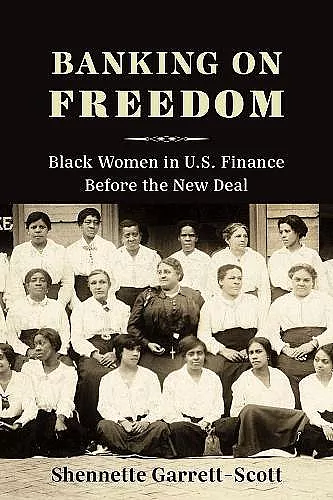Banking on Freedom
Black Women in U.S. Finance Before the New Deal
Shennette Garrett-Scott author
Format:Paperback
Publisher:Columbia University Press
Published:12th Apr '19
Currently unavailable, and unfortunately no date known when it will be back

Between 1888 and 1930, African Americans opened more than a hundred banks and thousands of other financial institutions. In Banking on Freedom, Shennette Garrett-Scott explores this rich period of black financial innovation and its transformative impact on U.S. capitalism through the story of the St. Luke Bank in Richmond, Virginia: the first and only bank run by black women.
Banking on Freedom offers an unparalleled account of how black women carved out economic, social, and political power in contexts shaped by sexism, white supremacy, and capitalist exploitation. Garrett-Scott chronicles both the bank’s success and the challenges this success wrought, including extralegal violence and aggressive oversight from state actors who saw black economic autonomy as a threat to both democratic capitalism and the social order. The teller cage and boardroom became sites of activism and resistance as the leadership of president Maggie Lena Walker and other women board members kept the bank grounded in meeting the needs of working-class black women. The first book to center black women’s engagement with the elite sectors of banking, finance, and insurance, Banking on Freedom reveals the ways gender, race, and class shaped the meanings of wealth and risk in U.S. capitalism and society.
Garrett-Scott’s extensively researched and documented study is the first history of U.S. finance that puts African American women at the center. Banking on Freedom makes a tremendously monumental contribution to African American banking history, and it substantially enriches our understanding of U.S. finance and capitalism. -- Juliet E. K. Walker, author of The History of Black Business in America: Capitalism, Race, Entrepreneurship
Shennette Garrett-Scott’s compelling and highly original account demonstrates that, for black people, banks were more than financial institutions. In the hands of black women, capital accumulation, credit, and insurance became community building practices, mutual aid, strategies for collective survival, and sources of contestation. Banking on Freedom offers a new perspective on the entire community and the nation. -- Robin D. G. Kelley, author of Thelonious Monk: The Life and Times of an American Original
Moving fluidly from the change purse to the bank vault, Banking on Freedom offers the first full accounting of the financial sector, womanhood, and Afro-America simultaneously transformed. Rich and brilliant. -- N. D. B. Connolly, author of A World More Concrete: Real Estate and the Remaking of Jim Crow South Florida
Recovering the important and active role black women have played in the development of modern American capitalism, Shennette Garrett-Scott’s Banking on Freedom is a paradigm-shifting work that stands to make a monumental contribution to the field and is certain to inspire future generations of scholars. -- Tiffany Gill, author of Beauty Shop Politics: African American Women’s Activism in the Beauty Industry
Garrett-Scott reclaims the stories of black women who—as bank founders and clerks, investors, aspiring home owners, loan seekers, and, yes, as those denied loans—asserted their own economic ethos. A compelling account of black women’s ideas about money, savings, lending, obligation, and economic well-being. -- Elsa Barkley Brown, University of Maryland
A beautifully written, comprehensive, and highly original study of black women’s savvy business acumen in the aftermath of slavery through the early twentieth century. Garrett-Scott should be commended for boldly modeling just how gender and race shape capitalism and finance in ways few scholars have addressed. -- Daina Ramey Berry, author of The Price for Their Pound of Flesh: The Value of the Enslaved, from Womb to the Grave, in the Building of a Nation
This recovery of one aspect of black women’s history will appeal to scholars as well as those with a serious interest in the history of finance and women’s history. * Publishers Weekly *
Garrett-Scott’s accounting is a work of economic history, but it reads less as a description of 20th century Black capitalism, and more as a rendering of what is possible when women and people of color can effectively channel their own money for personal and collective economic development. * Scalawag Magazine *
Banking on Freedom is a major contribution to the history of US capitalism. It will undoubtedly inspire new scholarship. It pushes readers to reframe black women’s fight for economic justice in the most expansive ways. -- Keona K. Ervin * Journal of African American History *
Garrett-Scott strikes a careful balance with a narrative that brings together a cross-section of fields, including social, economic, political, labor, and business history with significant depth for a fresh perspective. Banking on Freedom will stand as a groundbreaking piece of scholarship that offers a useable framework — a model —for historians interested in Black banking history. * Black Perspectives *
This exploration of gender and race in the making of modern US finance represents an important historiographical intervention. Banking on Freedom is also an engaging and accessible read that is ripe for the current political and economic moment. * Journal of American Ethnic History *
- Winner of Darlene Clark Hine Award, Organization of American Historians 2020
- Winner of Letitia Woods Brown Book Prize, Association of Black Women Historians 2019
- Winner of Bennett H. Wall Award, Southern Historical Association 2020
- Short-listed for Hagley Prize in Business History, Hagley Museum and Business History Conference 2020
ISBN: 9780231183918
Dimensions: unknown
Weight: unknown
288 pages